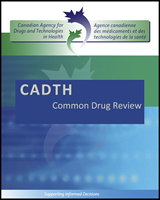Except where otherwise noted, this work is distributed under the terms of a Creative Commons Attribution-NonCommercial-NoDerivatives 4.0 International licence (CC BY-NC-ND), a copy of which is available at http://creativecommons.org/licenses/by-nc-nd/4.0/
NCBI Bookshelf. A service of the National Library of Medicine, National Institutes of Health.
Ustekinumab (Stelara) [Internet]. Ottawa (ON): Canadian Agency for Drugs and Technologies in Health; 2017 Apr.
Three phase III, double-blind randomized placebo-controlled trials investigated the effects of ustekinumab on treatment induction (UNITI-1 and UNITI-2) or maintenance (IM-UNITI) in patients with moderate-to-severe Crohn’s disease. A single ustekinumab IV administration (approximating 6 mg/kg) appears to be significantly superior to placebo for inducing clinical response after six weeks of therapy. Likewise, both the ustekinumab 90 mg SC every 12 weeks and every eight weeks maintenance-treatment regimens were statistically significantly superior to placebo in achieving clinical remission and corticosteroid-free remission in patients who had a clinical response at week 8 of induction therapy. Moreover, these results for induction and maintenance therapy with ustekinumab were reported in subpopulations of Crohn’s disease patients who had experienced a failure of conventional therapies or of TNF antagonist therapies. These findings were considered to likely be clinically meaningful by the clinician expert consulted by CDR. ▬ These were reported as key outcomes by patients providing input to this review.
The proportion of patients who experienced at least one adverse event or serious adverse event was similar between the ustekinumab and placebo groups across all of the included studies. Nasopharyngitis and upper respiratory tract infection were more frequently reported in ustekinumab-treated patients than in placebo-treated patients, but these did not lead to discontinuation of treatment. Administration-related reactions were relatively rare.
There were no studies in which ustekinumab was compared directly with the approved TNF antagonists or vedolizumab for induction or maintenance treatment of Crohn’s disease. Three indirect comparisons reviewed by CDR, including one submitted by the manufacturer, were challenging to interpret due to numerous limitations related to the source data and the NMA methods used to compare treatments. These limitations precluded any definitive conclusions regarding the efficacy and safety of ustekinumab compared with TNF antagonists and vedolizumab.
- CONCLUSIONS - Ustekinumab (Stelara)CONCLUSIONS - Ustekinumab (Stelara)
- Clinical and Economic Review Report: Vedolizumab (ENTYVIO SC)Clinical and Economic Review Report: Vedolizumab (ENTYVIO SC)
Your browsing activity is empty.
Activity recording is turned off.
See more...
